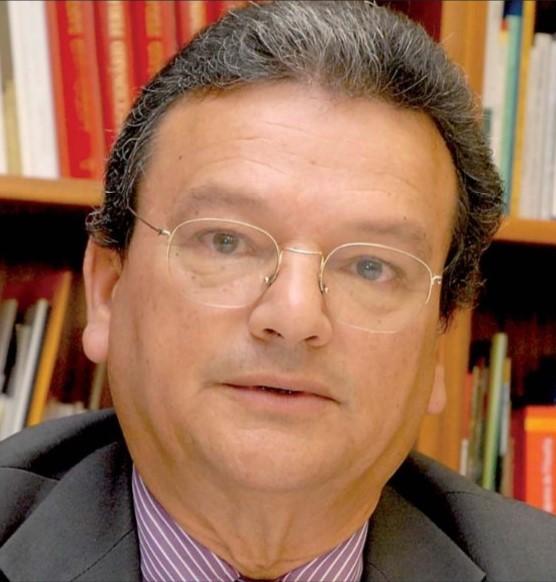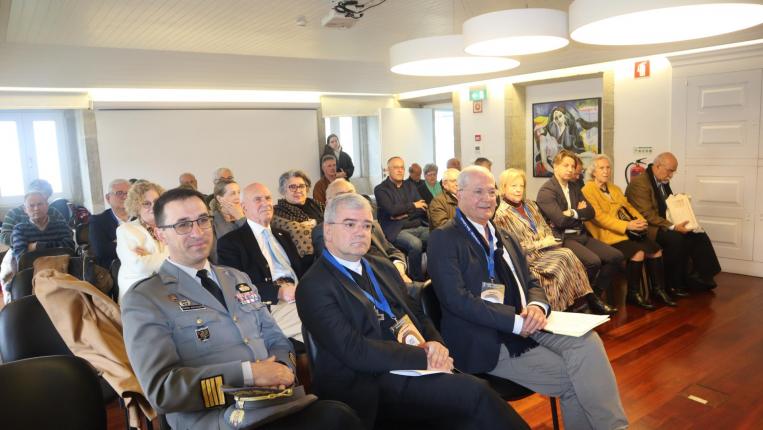Today, at 2:30 p.m., Luís da Silva Pereira is invited to a Literary Education Day at the Isidro Alves Auditorium of the Portuguese Catholic University, in Rua de Camões.
The first part of the program will feature a presentation of his most recent work, Histórias de Nonô, in dialogue with the author, a performance by the Allegro Academy and the presence of classes of children from the city's schools. Secondly, there will be a round table discussion on children's literature, discovering the world and training readers.
The event is free to attend.
This is an initiative by teachers who are part of Braga's Local Reading Plan (PLL), promoted by the Municipality of Braga, in collaboration with researchers from the Catholic and Minho Universities. At the same time as reflecting on the place of books and reading in the education of younger readers, tribute is being paid to this lecturer (Luis da Silva Pereira) from the Faculty of Philosophy and Social Sciences at UCP, after a life entirely dedicated to teaching and research at this university.

How did the inclination, taste or vocation for children's writing come about in the professor and researcher of Portuguese Literature, specializing in Camões?It came about almost by chance. To occupy the time when I was waiting at the A Brasileira café for my daughters who were attending the English course at the British Institute, I wrote those stories that won the Adolfo Simões Muller Prize for Children's Literature, which I called Davidim's Stories. Davidim was a child who had been playing inside me for a long time, as if calling me to give him a voice. I felt a special pleasure writing them, not least because they took me away from the more arid writing of academic work.
How do you find inspiration for your narratives, from the Historias de Davidim to the more recent Histórias de Nonô?
The inspiration for children's stories usually comes from concrete situations that catch my attention and enchant me with the spontaneity and innocence of children. Then I expand on them, letting my imagination run free, without forgetting, however, that the plots require verisimilitude, i.e. coherence and logic in the situations. I think this is how the vast majority of children's and non-children's literary narratives are born.
What are the biggest challenges of writing for children and young people, in terms of expression, language and style?
The biggest challenge is to be able to reconcile language that is accessible to children and young people with the need to enrich that language in order to enhance its expressiveness and develop the child's ability to think and express their emotions. Children's literature, like any other, should lead the reader not only to read the book, but to read themselves in the book. Children should feel that what they are reading somehow reveals what they feel and think about themselves and others.
In these stories, the reader encounters sequences that explore the world of fantasy and wonder. Why is this dimension important?
Yes, it's true. All stories present, from a certain moment on, events that take place in the marvelous world. The marvelous is the suspension of the laws of nature. In nature, animals don't talk, carpets don't fly... This oneiric dimension responds to the imagination of children and humans in general, and to the need to dream. Without dreams, the world cannot leap or advance, to paraphrase Sebastião da Gama. All children's literature is an invitation to the pleasure of dreaming.
Children's literature always conveys a set of values and a vision of the world. In your latest book, you start from the relationship between a granddaughter and her grandfather, as well as valuing the family. Why is that?
This relationship corresponds to reality. It's a relationship that happens every day, with its ups and downs, of course.
But it's a relationship that naturally includes parents, grandparents, friends and schoolmates. It is in this set of relationships, especially family relationships, that the child's personality and worldview is formed. Without them, children's personalities run the serious risk of being mutilated. Someone once told me that they really appreciated the strong presence of the grandparents in the stories. It happened naturally. I didn't do it on purpose. But I was happy to contribute to the revaluation of grandparents that we talk about so much today.
In the world we live in, is it important to emphasize the place of affection in family relationships?
Yes, the education of affections is fundamental. Affections, more than any other dimension of the personality, are the essential basis for integral human formation. Without them, the human personality becomes truncated. Human beings are much more driven by affections than by reason. Hence the importance of their proper education.
The various stories come together in the process of discovering the world and language itself. Why is this double discovery important?
Without language there is no humanity, no affections and no thought. The world is learned through the word. We ourselves become aware of who we are through the word. Hence the fundamental importance of learning verbal language. One of the most important functions, if not the most important, of children's literature is precisely the learning of the mother tongue. That's why it must be as correct as possible.
How do you follow the direction of children's literature in Portugal?
I follow it with great interest. Practically all of our most important writers like to take a leap, so to speak, into this special universe of literature, producing works of undeniable literary value. Children's literature in Portugal is second to none in the world. That's also why there should be special concern about getting children and young people to read. As far as I know, schools have taken great care to develop a love of reading in their pupils. This is highly commendable.
Interview with Cândido Oliveira and Luísa Magalhães - UCP/ CEFH
Biographical note
Luís Alexandre Cabral da Silva Pereira was born in Peso da Régua in 1947.
He has a PhD in Portuguese Literature from the Braga Faculty of Philosophy of the Portuguese Catholic University (UCP) with the thesis "Imagens da Lírica Camoniana. Repertoire and Interpretation". There he taught "Portuguese Literature", "Introduction to Literary Studies" and "Theory of Literature", among other subjects.
From 2010 to 2012, he was editor of the newspaper Diário do Minho, and is currently editor of the magazine Bracara Augusta, published by Braga City Council. In addition to articles on literary history and criticism in specialist magazines, and numerous lectures and conferences on literary themes, he has published:
- Quase Silêncio (poems). Braga, 1980.
- Histórias de Davidim (narrative). Lisbon, Ver-bo, 1993 (book awarded the Adolfo Simões Muller Prize for Children's Literature).
- From Christmas to Christmas. Braga, APPACDM, 1994.
- Tomás de Figueiredo ou a poética da casa. Braga, Lyons de Braga, 2002.
- "Jerónimo Baía, Vida e Obra", in Vertigens do Barroco, Monastery of São Martinho de Ti-bães, 2007.
- "A Cadeirinha de Rodas", in 50 Histórias de Quem Foi Criança, Sintra, Girassol, 2008.
- He set the text, prefaced and wrote the notes and glossaries for Rimas Várias, Flores do Lima, by Diogo Bernardes, Porto, Edições Caixotim, 2009.
- Histórias de Boca Aberta, Braga, Calígrafo, 2014.
- Semanalmente, Braga, Diario do Minho, 2021.





